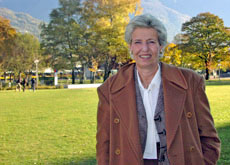
Equality still has a long road ahead

Chiara Simoneschi-Cortesi, a leading equality campaigner, says that there is still some way to go before men and women achieve equal status in Switzerland.
The parliamentarian says although some progress has been made, there is still not equal pay and women often find themselves hampered by old-fashioned attitudes.
Simoneschi-Cortesi is the president of the Federal Commission for Women’s Issues, an extra-parliamentary commission of women’s organisations, academics and professionals, which is celebrating its 30th anniversary this year.
Women only received the vote at federal level in Switzerland in 1971 – one of the last European countries to do so. The principle of equality between men and women has been enshrined into the Swiss constitution and since 1996 there has been a federal law on the subject.
Progress has been made in terms of education and training, but Simoneschi-Cortesi says there is still a big salary gap between the sexes. In the public domain this is ten per cent, but in private business this rises to about 20 per cent.
swissinfo: Why is there still inequality and discrimination despite the laws against it?
Chiara Simoneschi-Cortesi: It’s not easy to understand why there is still so much inequality, which, in many cases, becomes discrimination. The reality is very complex and made up of interacting economic, social and cultural factors. And the cultural dimension, linked to attitudes, is an important one.
To try to understand this you need to consider how the economy and society is currently organised and the distribution of the roles between the sexes. The organisation of economic, social and political life has remained the same as when there was only one possible role for women – the home and family.
The world has not adapted to these changes because it didn’t know how or didn’t want to acknowledge the new roles – professional, family, social and political – assumed by women. Besides, a totally equal distribution of roles and tasks between men and women within the family has not yet occurred. This is why women shoulder many different burdens.
swissinfo: Some inequality is blatant but some forms are not so obvious but are equally as serious.
C. S-C.: The working world is one in which pay disparities are clearly quantifiable but where discrimination creeps in at other levels – in opportunities or training, advancement or career possibilities.
I’m talking about the so called “glass ceiling”, this invisible and treacherous barrier which does not allow women to go forward, acquire more prestige or be involved in decision-making. The organisational structures, still firmly in male hands, prevent women from reaching the upper echelons.
This becomes more complicated if a woman has children. Denied the possibility of combining work and family – she often doesn’t have a partner willing to share this type of responsibility – she is forced in some way to stay where she is. This comes at the cost of losing valuable expertise that would be useful to the company.
swissinfo: Part-time working is often raised as a way of women staying in the game.
C. S-C.: The extension of part-time working to intermediate and high [company] levels is without doubt an option and is feasible. Several studies have shown that it is possible to work part time even in the upper echelons.
Part-time and job sharing would also give men the possibility of being more involved in the family, thus distributing the roles more equally between the partners without sacrificing careers. It’s up to the economy to acknowledge the innovativeness of this solution and to put it into practice by valuing the human resources at its disposal.
swissinfo: How can you explain the contradictions in terms of recognition of women? And where are they most present?
C. S-C.: [They are present] on the cultural and mentality levels, which dramatically reflect continuing prejudices. Power mechanisms also make relations and situations more complicated.
From this point of view the situation is sometimes not too rosy: there are the “nostalgic” people who want women to return to the stove, but there are also some women at senior management level who don’t promote equal opportunities. Men often are afraid of women who fight for emancipation. This is how misunderstandings and fears continue to feed prejudices.
swissinfo: How can this be dealt with?
C. S-C.: If they want to, men and women can be the best companions on the journey towards emancipation and the creation of a fairer society. It’s clear that while women were fighting to get out of the ghetto, many men stayed where they were. They have never really processed these huge changes, which I realise are not so easy to process.
Perhaps they are not yet ready for this new role as partner and father. But cultural changes cannot be made in a flash. It needs time, generations and patience. For this reason it’s worth continuing to believe in equality between women and men – as a value and as a resource.
swissinfo-interview: Françoise Gehring in Lugano
Equality for women in Switzerland is celebrating several anniversaries this year:
It is 35 years since women were given the right to vote and 30 years since the creation of the Federal Commission for Women’s Issues.
It is 25 years since equality was enshrined into the constitution, 15 years since women first held a national strike and ten years since the equality law came into force.

In compliance with the JTI standards
More: SWI swissinfo.ch certified by the Journalism Trust Initiative






























You can find an overview of ongoing debates with our journalists here . Please join us!
If you want to start a conversation about a topic raised in this article or want to report factual errors, email us at english@swissinfo.ch.